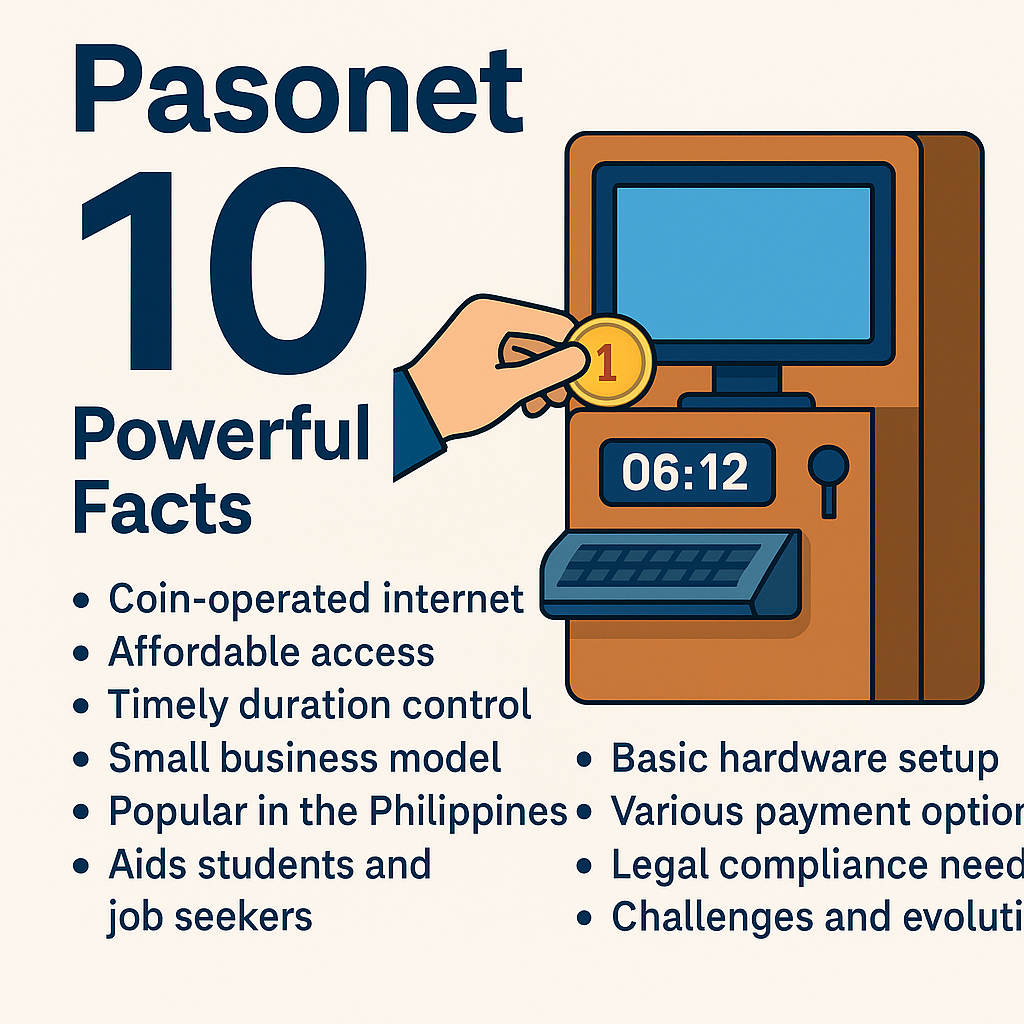Pasonet or Pisonet The Coin Internet Machine in the Philippines
Pasonet also called Pisonet is a small business idea that gives people cheap internet access
It is a coin operated computer or WiFi machine that lets people use the internet for a few minutes by paying only one peso Dihward.
This system started in the Philippines and became popular in towns and cities.It shows how people can use simple ideas to solve problems and earn money.
What is Pasonet
Pasonet means Piso Net or Internet by one peso
It lets a person surf the web for a short time by inserting coins into a machine
The goal is to give affordable internet access to people who cannot pay monthly fees
Main Features
| Feature | Description |
|---|---|
| Access Type | Coin operated PC or WiFi |
| Cost | One peso for a few minutes |
| Location | Streets stores or public areas |
| User | Students workers gamers and families |
| Business Type | Small local business |
| Time Control | Machine stops when time ends |
| Internet Source | Broadband or mobile data |
Short History
Pasonet started around the early 2010s in the Philippines
It came from the idea of internet cafes but offered cheaper and shorter access
Small shop owners placed computers in metal boxes and added coin slots
This system allowed people to use the internet anytime they wanted
It fit the Filipino habit of buying things in small portions also known as tingi
How Pasonet Works
Hardware
A Pasonet machine usually has
- One computer or laptop
- A coin slot that accepts pesos
- A timer that controls usage
- A cabinet made of wood or metal
- A fan to stop overheating
The coin slot connects to a timer board
When a person inserts a coin the timer starts
After the time ends the screen turns off or locks until another coin is added
Software
The software starts and stops the computer access
It counts the time and shows a message when it is almost done
The owner can set how many minutes one peso gives
Most owners set four to seven minutes per peso
Different Types
- Classic Pasonet uses a computer with a coin slot
- Piso WiFi lets users connect their own phones to the WiFi network after paying coins
- Hybrid units use both PC and WiFi access
Business Model
Pasonet is a small and low cost business
A person can start it with a few computers and an internet line
Income Source
- Coins from users
- Small printing service
- Optional snacks or drinks for sale
Expenses
- Internet plan each month
- Electricity
- Maintenance and cleaning
- Space rental if needed
Sample Cost Table
| Type | Average Monthly Cost | Description |
|---|---|---|
| Internet Plan | 1500 pesos | Broadband or DSL |
| Electricity | 800 pesos | For PC and fans |
| Repair | 300 pesos | Basic maintenance |
| Other Costs | 400 pesos | Cleaning and security |
| Total Cost | ~3000 pesos | Monthly total |
A busy Pasonet can earn more than its costs if many people use it daily
Why Pasonet Is Important
Social Value
- Helps people go online who cannot buy mobile data
- Supports students doing research or assignments
- Helps job seekers send applications
- Keeps families connected through chat and email
Economic Value
- Gives extra income to small store owners
- Creates small local jobs for technicians
- Increases digital access in poor areas
Technical Setup
Connection
- Pasonet uses
- DSL or fiber broadband
- Shared WiFi connection
- Sometimes mobile hotspot internet
Maintenance Tips
- Clean the coin slot often
- Keep air vents clear
- Restart computers daily
- Check wires for damage
Safety Tips
- Use padlocks to stop theft
- Add a camera for security
- Turn off the machine at night
Piso WiFi the New Version
Piso WiFi is a newer form of Pasonet
It gives WiFi access instead of computer time
Users connect their phones and pay by coin or digital wallet
Main Benefits
- Cheaper to start because no computers needed
- Easier to maintain
- Can serve many people at the same time
Sample Piso WiFi Prices
| Time | Cost | Use |
|---|---|---|
| 5 minutes | 1 peso | Quick search |
| 30 minutes | 5 pesos | Light use |
| 1 hour | 10 pesos | Study or chat |
| 12 hours | 50 pesos | Long session |
Piso WiFi works well in schools shops and small communities
Legal and Ethical Points
Some Pasonet owners run without permits
This can cause trouble with local government
Good Practices
- Get a small business permit
- Use legal software
- Follow rules for minors using computers
- Place machines in safe and public areas
Legal operation helps the business grow and gain trust
Benefits of Pasonet
Economic Benefits
- Small capital needed to start
- Can earn passive income
- Uses existing internet connection
Social Benefits
- Makes internet affordable for everyone
- Builds small community centers around the machines
- Helps children learn digital skills
Education Benefits
- Gives access to online lessons
- Helps students with schoolwork
- Allows teachers to print materials
Common Problems
Technical Problems
- Machines overheat
- Timer errors stop sessions
- Coin slots jam with dirty coins
Business Problems
- Some areas have low customer traffic
- Internet may slow down at peak time
- Low profit if power cost is high
Social Problems
- Some users stay too long and crowd the area
- Others may access adult or harmful content
Cultural Impact
Pasonet became part of Filipino street life
Children and teens spend short breaks playing games or chatting online
Parents use it to message relatives abroad
Neighbors meet and talk while waiting for their turn
It is more than a machine
It is a small space where people share time and stories
For many Filipinos the first time they used the internet was on a Pasonet machine near a sari sari store
Modern Updates
Technology keeps changing but Pasonet also evolves
New Ideas
- Use solar panels in rural areas
- Add QR code or GCash payment
- Add digital screen with time countdown
- Use auto restart to save power
Extra Services
- Phone charging station
- Printing and scanning
- Mobile load selling
These updates make the business more useful to modern users
Example of Modern Add Ons
| Feature | Function |
|---|---|
| Solar Power | Runs without electricity bill |
| QR Payment | Cashless and easy to use |
| Auto Restart | Keeps uptime high |
| Bandwidth Control | Equal speed for all users |
| Timer Display | Shows remaining time clearly |
Lessons from Pasonet
Innovation grows from need
People create solutions when life is hard
Small steps make big change
Paying one peso at a time still brings access to many
Technology must fit people
Simple systems work best when designed for real life use
Access is more than hardware
It is about inclusion learning and connection
Adaptation is key
Updating machines keeps them alive in a changing world
The Future of Pasonet
Trends
- Piso WiFi will grow faster than computer based systems
- Some will use satellite internet for remote towns
- More cashless payments like e wallets will appear
- Local governments may support free access through shared Pasonet stations
New Opportunities
- Combine Pasonet with public e learning centers
- Add services like government form printing and online bill payment
- Connect Pasonet units to solar energy grids
Dream for the Future
Pasonet can become part of digital community hubs
Each kiosk can offer learning games online work and public service in one spot
Tips for New Owners
Before Starting
- Find a place with good foot traffic
- Check that the internet signal is strong
- Start with one or two machines
During Operation
- Clean machines daily
- Record daily income and expenses
- Help users if they have problems
For Growth
- Add WiFi routers to reach more users
- Offer bundle time for students
- Advertise near schools or markets
Frequently Asked Questions
What is Pasonet?
Pasonet is a coin internet system in the Philippines that gives cheap online access for a few minutes using one peso.
How does Pasonet work?
Pasonet works when a user drops a coin into the machine then the computer or WiFi unlocks for a set time until the timer ends.
Who can use Pasonet?
Anyone can use Pasonet Students job seekers gamers and families use it to go online for study work and chat.
What are the benefits of Pasonet?
Pasonet gives low cost internet access and helps people learn online It also helps small shop owners earn extra income.
How much does it cost to use Pasonet?
Most Pasonet machines charge one peso for four to seven minutes Some Piso WiFi units offer longer time for more coins.
What do you need to start a Pasonet business?
You need a computer or WiFi router an internet plan a coin slot and a safe cabinet to protect the unit.
Is Pasonet legal in the Philippines?
Yes Pasonet is legal if you follow business permit rules and use licensed software Local laws may vary by area.
What is the difference between Pasonet and Piso WiFi?
Pasonet uses computers while Piso WiFi lets users connect with their phones Both use coins and timers for access.
Why is Pasonet still popular?
Pasonet is still popular because it gives affordable and easy access to the internet in places where data is costly.
Can Pasonet use digital payment?
Yes modern Pasonet units can use QR code and e wallet payments like GCash for cashless and safe use.
Conclusion
Pasonet also called Pisonet is a true Filipino invention
It gives power to people who need cheap and easy internet
It helps students learn and families stay in touch
It supports small business owners in poor areas
With one coin a person can open the world of knowledge
This is the real spirit of Pasonet
A small idea that makes a big difference

